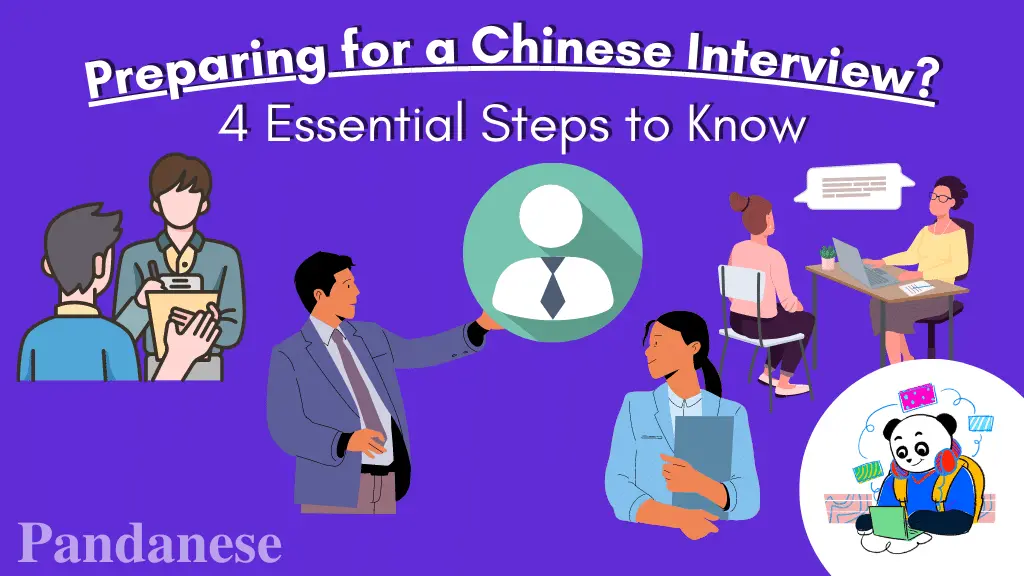
Preparing for a Chinese Interview? 4 Essential Parts To Know
China has become a place for international professionals to build their careers in numerous industries. Being able to speak Chinese will open opportunities.
If you want to work in China or any Chinese-speaking country, being in a Chinese-language job interview can be intimidating for many foreigners.
The good news is we're here to help to let you know about Chinese interview etiquette.
Whether this is your first interview or coming from a previous job, we'll review everything you need to know about preparing for a Chinese job interview.
Will learning Chinese help me get a job?
Knowing Chinese will expand the employment pool for you, especially if you're able to speak Mandarin Chinese, the second most spoken language in the world.
Jobs that require Chinese language skills are diverse, such as interpreting, research, data analyzing, marketing, etc. China recently removed a work experience requirement for foreign postgraduate candidates, creating new opportunities for many non-native university graduates on the job hunt.
Your interviewer will know that Mandarin isn't your native language, but it's best to prepare for anything in the interview in Chinese.
What does the Chinese job interview process look like?
Part 1: Introduce yourself.
请自我介绍一下 |
Qǐng zìwǒ jièshào yīxià |
Please introduce yourself |
This phrase is among the most asked interview questions in any nation or language. It occurs at the beginning of the interview.
While this can be a simple request, it's worth thinking through your response beforehand.
Many interviewees struggle with picking which aspects of their life they want to share. For example, you can share your background, educational accomplishments, and career history. However, keep the answer professional without making it sound too stiff.
Let's start with how you can create an introduction:
您好 … 经理 |
Nínhǎo, …jīnɡlǐ |
Hello, manager + Name of the interviewer |
It's Chinese business etiquette to address your superiors or colleagues by their job title, such as 经理 (jīnglǐ or manager) after your interviewer's surname.
However, if you don't know the specific position of the interviewer within the company, place either 女士 (nǚshì; Mrs.) or 先生 (xiānshēng; Mr.) after your interviewer's surname. For example, 您 好… 女士/先生 (Nínhǎo, … nǚshì/xiānshēng) — Hello, Mrs. / Mr. (name of interviewer)
After greeting your interviewer, you can talk about yourself, such as where you come from.
我来自(country) |
wǒ láizì (country) |
I'm from (country) |
After you've established your personal background, move on to your educational history, such as your education level, major, and any degrees that you have obtained.
我毕业于… |
wǒ bì yè yú… |
I graduated from… |
我学的专业是… |
Wǒ xué de zhuānyè shì… |
I majored in… |
我 (year) 年毕业于(university’s name)大学,获得 (field of study) 硕士/博士学位 |
Wǒ (year) nián bìyè yú (university’s name) dàxué, huòdé (field of study) shuòshì / bóshì xuéwèi |
I (year of graduation) graduated from (university) and received a (field of study) masters/doctoral degree. |
To wrap up your introduction, describe your relevant jobs after graduating. Here is a common sentence structure for this section:
我曾在 (company name) 负责 (job duty) |
Wǒ céng zài (company name) fùzé (job duty) |
Previously at (company name), I was responsible for (job duty). |
Part 2: Explain why you want this job
你为何想申请这份工作? |
Nǐ wèihé xiǎng shēnqǐng zhè fèn gōngzuò? |
Why would you like to apply for this job? |
Once you introduce yourself, your interviewer wants to know your interest in this job—a tricky question since they want to evaluate your skills, why you want this job, and what you bring to the team and company.
Like Western companies, it's always best to research the job and the Chinese company beforehand. That way, you can show off what you know and are ready to work for them.
贵公司享有悠久的声誉 |
Guì gōngsī xiǎngyǒu yōujiǔ de shēngyù |
Your company has a long-standing reputation |
In Chinese culture, pride, and reputation are highly valued. When Chinese people talk about those qualities, they use “mianzi,” translated as “face.” It is a concept of how others perceive you, and the respect you command from them is very important to Chinese business.
Therefore, offering compliments or giving face to your prospective employer will certainly position you in a favorable light.
Additionally, when explaining why you'd like the job, mention the ways that you hope to grow professionally and contribute to the company, for example:
我相信在贵公司可以学到新的技能 |
Wǒ xiāngxìn zài guì gōngsī kěyǐ xué dào xīn de jìnéng |
I believe I can learn new skills at this company |
这份工作可以让我尽其所长 |
Zhè fèn gōngzuò kěyǐ ràng wǒ jìnqísuǒcháng |
I'll put my skills to full use at this job |
Part 3: Describe your strengths and weaknesses
Describe your strengths
你最大的优点是什么? |
?Nǐ zuì dà de yōudiǎn shì shénme? |
What's your greatest strength? |
This question is one of the most beloved and hated ones to be asked. There are many ways to answer, yet, you want to avoid coming off as self-promoting or giving a bland and generic response.
You may have multiple skills that you have sharpened over time but think about the skills most relevant to the position in question so you can make the most of your airtime. Below are sentence constructions to demonstrate your abilities.
我是个很 (adjective) 和 (adjective) 的人 |
Wǒ shì gè hěn (adjective) hé (adjective) de rén |
I'm a very (adjective) and (adjective) person |
Common characteristics likely to be well-received by Chinese employers include:
热情 (rèqíng, enthusiasm or passion)
负责任 (fùzérèn, responsible)
积极 (jījí, energetic or positive)
主动 (zhǔdòng, proactive)
我擅长 |
Wǒ shàn cháng… |
I'm adept at… |
Some soft skills are in demand in today's workforce, and if you have a chance to mention them, chances are you'll get a plus point. These skills can include:
领导能力 (lǐngdǎo nénglì, leadership skills)
团队管理 (tuánduì guǎnlǐ, team management skills)
沟通技巧 (gōutōng jìqiǎo, communication skills)
Identifying the strengths you'd like to showcase during your interview and researching relevant Chinese vocabulary will help you confidently answer this interview question.
If you want to learn more Chinese vocabulary, consider Pandanese. The Chinese Wanikani flashcards combine mnemonics and the SRS learning system to help you learn and build Chinese vocabulary. Using Pandanese online or with the Pandanese App, you can increase your Chinese proficiency and feel more prepared to tackle anything, including interviews.
Describe your weaknesses
你的弱点是什么? |
Nǐ de ruòdiǎn shì shénme? |
What are your weaknesses? |
Answering “What are your weaknesses?” might be difficult, especially if you intend to discuss your qualifications, talents, and abilities that make you the fittest candidate for the position.
But if you combine self-awareness with a solution to your weaknesses, you're framing your limitations in a good light. The key to preparing for this question is identifying your shortcomings that still communicate strengths. It will show the interviewer you're introspective enough to know your areas of opportunity.
Examples are:
我刚从学校毕业,没有很多社会经验 |
Wǒ gāng cóng xuéxiào bìyè, méiyǒu hěnduō shèhuì jīngyàn. |
I graduated recently and don't have much (social/life) experience. |
我的中文不够好! |
Wǒ de Zhōngwén bùgòu hǎo! |
My Chinese isn't good enough! |
我重视陪家人的时间,所以恐怕周末不方便加班 |
Wǒ zhòngshì péi jiārén de shíjiān, suǒyǐ kǒngpà zhōumò bù fāngbiàn jiābān. |
*I value spending time with my family, so I'm afraid I can't work overtime on the weekends. |
*Note: Overtime is particularly common in China's tech industry, where workers toil in a grueling ‘996' work culture, which refers to working 12-hour days, from 9 am to 9 pm, 6 days per week.
Part 4: Wrap up the interview
This section usually includes a brief chance for questions, a thank-you to candidates for coming to the interview, and an explanation of when and how the candidate will hear back from the company. This part is generally short, lasting around five minutes. At this stage, you'll probably hear the following sentence (or a similar closing remark) from your interviewer:
我们会在一个星期之内打电话通知您面试的结果! |
Wǒmen huì zài yīgè xīngqí zhī nèi dǎ diànhuà tōngzhī nín miànshì de jiéguǒ! |
We'll notify you of your interview results within a week. |
Before shaking hands and walking out the door, remember to thank your interviewer for their time and the chance to audition for the job with a courteous statement like the one below:
感谢给我这次面试机会 |
Gǎnxiè gěi wǒ zhè cì miànshì jīhuì. |
I appreciate this interview opportunity. |
And end your interview with a slight bow as that is customary in a Chinese formal setting.
In closing
Preparing for any job interview can be stressful, let alone in another language. Knowing the process, what questions interviewers, and key Chinese phrases will help reduce your stress.
Following these tips can enhance your chances of success in a Chinese job interview to pave your career in Chinese or any Chinese-speaking country.
The easiest way to learn Chinese & build vocabulary

